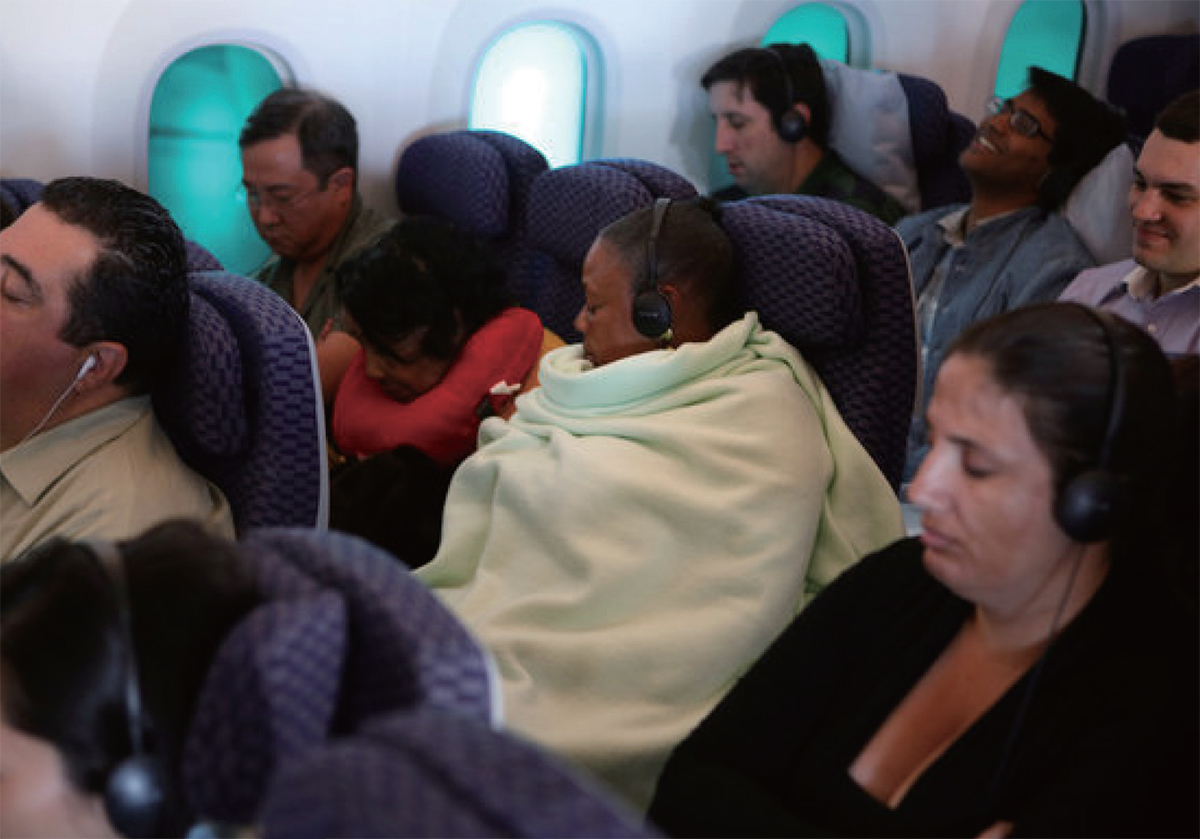- 잦은 항공여행이 부럽다고?

JET-SETTING IS A SYMBOL OF SUCCESS?
Frequent air travel has hidden health risks and social consequences.Consultants who commute to distant cities by air every week, business executives who hop on planes to take meetings around the world, and others whose work requires constant movement are often perceived to be leading glamorous lives. Jet-setting is a symbol of success, being connected, and having attained high social status. But such frequent travel is accompanied by frequently overlooked downsides.
In a study recently published in the journal Environment and Planning A, Scott A. Cohen of the University of Surrey in England and Stefan Gössling of Lund and Linnaeus Universities in Sweden reviewed and synthesized previous research to shed light on both the glamorization and detrimental effects of hypermobility. The researchers found that “the brighter side of hypermobility is persistently glamorized in contemporary discourse, with the darker sides largely overlooked and ignored, and even made invisible.”
The subjects of the paper are a relatively small group of “mobile elite” who tend to have high incomes, access to health care, and quality housing, and who account for a disproportionate amount of distance traveled. For example, 5 percent of France’s population accounted for as much as half of overall distance traveled by French residents while in Sweden 3 percent of the population made roughly a quarter of Swedes’ international trips. Business travel also skews very male-heavy, with one study indicating that 77 percent of U.S. citizens on business trips in 2002 were male.
The consequences of frequent travel, the researchers say, can be broken down into three categories: physiological; psychological and emotional; and social.
The first of the three includes jet lag, or the disruption of the body’s circadian rhythms. Citing several studies, the researchers explain that jet lag can cause fatigue and gastrointestinal problems, and can also influence genes linked to aging and the immune system, increase the risk of stroke or heart attack and, in its chronic form as demonstrated by a study on cabin crew, cause cognitive deficits like memory impairment.
Air travel also increases the risk of deep-vein thrombosis, or the formation of a blood clot often in the legs, and it exposes passengers to germs. Those who fly far and frequently are also exposed to high amounts of radiation, with one study showing that commercial air crew’s having more exposure than nuclear power workers. Frequent business travelers also have fewer opportunities to exercise and tend to exhibit worse eating habits while in transit than at home.
Travel also has a psychological and emotional impact. Stress can set in while preparing and making arrangements at home and work before trips. In addition, business trips are not usually associated with a reduced workload and can create extra stress about about tasks accumulating while away.
Meanwhile, flight delays can cause anxiety and fatigue, as can the need to navigate new environments and cultures while under time constraints. Overall, constant movement can be disorienting and lonely, the researchers write—so much time spent away from home and family can be isolating for both those who travel and those who are left behind.
Relationships with family, friends and community can also end up damaged by excessive travel. One study found that a child’s behavior can worsen when a parent spends extended periods of time away for business travel. Other research showed that frequent trips create an imbalance in domestic duties and child care. Since men constitute a majority of business travelers, that most often ends up creating additional domestic burdens for women. Time at home between trips is often spent recuperating from fatigue and otherwise with immediate family, leading friendships and other social networks to weaken.
Since frequent travel is becoming more common, the researchers write, the negative effects could begin to impact a broader population. In addition, they view the focus on glamor of frequent travel as a barrier to behavior change and believe evidence to the contrary could help. Their work and further research in this direction, they hope, could alter the current situation.
잦은 항공여행이 부럽다고?
성공의 상징으로 여겨지지만 생리적·심리적·사회적으로 악영향 줄 수 있다는 연구 결과 나와매주 비행기를 타고 먼 도시로 통근하는 컨설턴트. 세계 각지에서 열리는 회의에 참석하기 위해 수시로 비행기에 오르는 기업체 간부. 그 밖에 직업상 끊임없이 항공여행이 필요한 사람들. 이들은 화려한 삶을 영위하는 것으로 인식되는 경우가 많다. 비행기를 타고 동에 번쩍 서에 번쩍하는 제트족 생활은 사회적 지위가 높고 인맥이 넓은 성공한 사람의 상징으로 받아들여진다. 하지만 잦은 항공여행에는 흔히 간과되는 단점이 있다.
최근 국제 학술지 ‘환경과 플랜 A’에 실린 한 연구는 이전의 연구들을 검토·종합해 잦은 항공여행의 미화 현상과 악영향을 조명했다. 영국 서리대학의 스콧 A 코언과 스웨덴 룬트대학의 스테판 괴슬링은 “현대 담론에서 잦은 항공여행의 밝은 측면은 끊임없이 미화되며 어두운 측면은 대체로 간과되거나 무시되고 심지어 은폐되기도 한다”는 사실을 발견했다.
이 연구의 대상은 소수의 ‘모바일 엘리트’다. 소득이 높고 건강 관리를 잘 받으며 좋은 집을 소유하고 항공여행을 자주 하는 사람들이다. 예를 들어 프랑스에서는 인구 5%의 항공여행 거리가 전체의 절반을 차지한다. 스웨덴의 경우 인구 3%의 해외여행 건수가 전체의 약 4분의 1을 차지한다. 또 출장여행은 남성이 압도적으로 높은 비율을 차지했다. 한 연구에 따르면 2002년 미국인 출장여행자 중 77%가 남성이었다.
연구팀은 잦은 항공여행의 영향을 생리적, 심리·감정적, 사회적 등 3개 부문으로 나눠 설명했다.
첫째, 생리적 영향에는 시차 적응 문제와 생체주기리듬의 혼란이 포함된다. 연구팀은 몇몇 연구를 인용해 시차는 피로와 위장장애를 유발할 수 있으며 노화나 면역체계와 연관된 유전자에 영향을 줄 수 있다고 설명한다. 또 뇌졸중이나 심장마비의 위험을 증가시킨다. 만성적인 영향으로는 항공기 승무원에 관한 한 연구에서 드러났듯이 기억장애 같은 인지결손을 초래할 수 있다.
또한 항공여행은 심부정맥혈전증이나 다리 혈전 형성 위험을 증가시킨다. 장거리 항공여행을 자주 하는 사람들은 또 다량의 방사능에 노출된다. 한 연구에서는 상용 항공사의 승무원이 핵발전소 직원보다 더 많은 방사능에 노출된다는 결과가 나왔다. 한편 출장이 잦은 사람들은 집에 있을 때보다 항공여행 중에 운동할 기회가 줄어들고 식습관도 더 나빠지는 것으로 드러났다.
둘째, 심리적·감정적 영향을 살펴보자. 여행 전 집이나 직장에서 스케줄을 정하고 항공편 예약을 하는 등 준비 과정에서 스트레스 받을 가능성이 있다. 게다가 출장여행은 업무량이 평소보다 줄어들지 않는 경우가 많으며 출장 중 처리해야 할 일 때문에 별도의 스트레스가 더 쌓일 수 있다.
한편 항공기 연착은 불안과 피로를 유발할 수 있다. 제한된 시간 안에 새로운 환경과 문화에 적응해야 한다는 압박감도 마찬가지다. 연구팀은 전반적으로 끊임없이 이동하는 생활은 정체성의 혼란과 외로움을 유발할 수 있다고 썼다. 집과 가족으로부터 장기간 떨어져 지내다 보면 여행하는 사람이나 집에 남아있는 사람 모두 고립감을 느끼게 된다.
셋째, 사회적으로는 어떤 영향을 미칠까? 잦은 여행은 가족과 친구, 지역사회와의 관계에 손상을 입힐 수 있다. 한 연구는 부모 중 한쪽이 출장으로 집을 너무 오래 비울 경우 자녀의 행동이 나빠질 수 있다는 사실을 발견했다. 또 여러 연구에 따르면 잦은 여행이 가사 의무와 자녀 양육에 불균형을 초래할 수 있다. 출장여행자 대다수가 남성이기 때문에 그 배우자인 여성의 가사 부담이 더 늘어나게 된다. 또 여행 사이사이 집에서 지내는 시간은 피로 회복을 위해, 또는 가까운 가족과 함께 보내기 때문에 우정과 기타 사회적 관계의 약화를 초래한다.
연구팀은 항공여행이 갈수록 보편화됨에 따라 그 부정적인 영향이 더 넓은 인구층에 영향을 미치게 될 가능성이 있다고 말한다. 또한 잦은 항공여행의 매력에 초점을 맞추는 경향이 행동 변화에 방해가 된다고 믿는다. 그들은 자신들의 연구와 이 방향에서 이뤄질 향후 연구가 현재의 상황을 바꿀 수 있기를 희망한다.
- STAV ZIV NEWSWEEK 기자 / 번역 정경희
ⓒ이코노미스트(https://economist.co.kr) '내일을 위한 경제뉴스 이코노미스트' 무단 전재 및 재배포 금지










![‘중티’ 나는 남자와 ‘팩폭’ 날리는 여자, 시트콤보다 더 시트콤 같은 ‘여단오’ [김지혜의 ★튜브]](https://image.isplus.com/data/isp/image/2026/01/11/isp20260111000031.400.0.jpg)
![면봉 개수 → 오겜2 참가자 세기.. 최도전, 정직해서 재밌다 [김지혜의 ★튜브]](https://image.isplus.com/data/isp/image/2025/12/21/isp20251221000019.400.0.jpg)



당신이 좋아할 만한 기사
브랜드 미디어
브랜드 미디어
중국 시장 놓칠라, 투자 늘리고 가격 낮추는 빅파마들[클릭, 글로벌 제약·바이오]
바이오 성공 투자, 1%를 위한 길라잡이팜이데일리
일간스포츠
일간스포츠
알카라스, 호주오픈서 조코비치 꺾고 최연소 커리어 그랜드슬램 달성
대한민국 스포츠·연예의 살아있는 역사 일간스포츠일간스포츠
일간스포츠
일간스포츠
"밥 대신 과자 먹습니다"… Z세대가 바꾼 식탁 '스낵킹' 시대
세상을 올바르게,세상을 따뜻하게이데일리
이데일리
이데일리
[마켓인]뜨거운 '피지컬 AI'…VC, 로봇 브레인에 꽂혔다
성공 투자의 동반자마켓인
마켓인
마켓인
'출시 2년 만에 점유율 7.5%'…아이센스, 연속혈당측정기 사업 ‘잭팟’ 가능할까
바이오 성공 투자, 1%를 위한 길라잡이팜이데일리
팜이데일리
팜이데일리